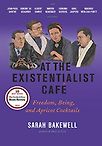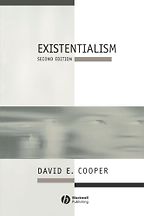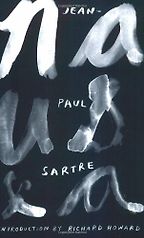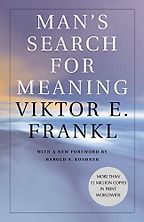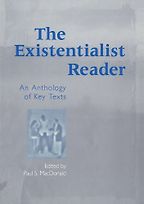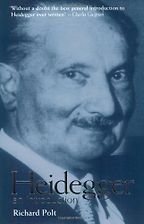Before we get to the books, can you begin by saying what existentialism is?
That’s a difficult question to answer. Most of the people we think of as existentialists denied being existentialists — it’s practically the only thing they have in common. I think of it as a philosophy that broke with the long tradition of defining human consciousness and the material world primarily through abstract concepts or essences. Instead, existentialism starts with concrete, individual existence, and proceeds from that to try and understand how we go about existing. Sartre famously defined it as “Existence precedes essence.” This is a definition of existentialism that is quite puzzling just naked like that, but that’s really what it translates into. It’s a philosophy that starts with the concrete and individual reality right now, and then looks for definitions and ways of understanding it and ways of behaving in the world.
Sartre is describing what it is to be human, isn’t he? For objects, their essence does precede their existence, there is something that they’re like. But human beings are different. We don’t have a pre-existing essence or nature.
That’s right. It is a very specific meaning of “existence” that the existentialists use, which refers to human existence. The way the table sits in front of me is not the same way that I sit in front of the table, because I have the freedom to choose how to sit in front of the table, to choose what to make of my being here in front of the table. I’m not just given as I am, I have to choose how to exist at every moment. So there’s an immense freedom at the heart of existentialism, and at the heart of what a human being is as well. But the freedom is only half of the equation, because I’m also always in a situation. I’m not floating about in space as an abstract, God-like consciousness that can choose to be whatever I want to be. I am in a body, affected by the objects and the other people around me and my position in history and in geography. I’m a person of a certain age and of a certain environment and I have to deal with what’s given to me.
Let’s begin with the first of the books you’ve chosen, David Cooper’s Existentialism: A Reconstruction.
This is a fabulous, clear introduction to existentialist thought. It’s also very philosophically rigorous. It tends to steer away from the literary side of existentialism, and it avoids some of the authors that proceed more through essays or novels like Camus. But it makes up for that by really putting existentialism within the philosophical tradition and looking at it as a system of philosophical thought. Cooper’s starting point is the human condition: we’re situated in the world but we’re alienated from it, we don’t feel that we quite belong, that we quite fit. That feeling is what drives existentialists. He works from that through other key ideas about self and others, about angst and anxiety — the anxiety we feel from being free — about absurdity, about freedom and he finishes up with ethics. So it’s a fantastic tour through the existentialist landscape.
Would you recommend it as a starting point for somebody who knew nothing about existentialism?
Yes, I think it’s a great way into it. There are lots of good books that introduce the ideas of existentialism, but this is one that gives a lot to think about and opens up interesting perspectives.
When did existentialism start?
That’s a good question. Some people have traced it right the way back, to the first time human beings in literature started feeling anxious or separated from the general state of being around them and began worrying about their lives and their existence. If you do that, you can find it in Job in the Bible, for example. Job has been cited as a proto-existentialist. Job definitely captures the spirit of existential questioning, but I think it becomes a bit too general: to say this is to make existentialism practically identical with the human condition. Existentialism is more specific. It’s a particular way of philosophizing about the human condition in terms of situation and freedom.
“Most of the people we think of as existentialists denied being existentialists — it’s practically the only thing they have in common.”
Certain key figures start to show an existentialist sensibility. Kierkegaard is often cited, but he’s very inward, he doesn’t look much at our position in the world. Nietzsche is another precursor: he almost goes the other way because he analyzes all the human condition in terms of forces, of power, of our physical being in the world. Another writer often mentioned is Dostoyevsky: a great way of getting into the real miserabilist side of existentialism is to read his Notes from the Underground. It absolutely captures the anguish of being an isolated individual and a misfit, wondering about your place in the world and being contrary, fighting against the normal human life that you’re supposed to fit into.
But to say where existentialism really begins is not that easy. It’s when all of those things come together, so you’ve got this feeling of being alienated and not fitting into the world of the human individual combined with a reversal of the usual philosophical tendency to say, “Well there’s human consciousness on the one side, and there’s the physical world on the other, and the two are completely separate.” Existentialism begins when people start to look at human life in the world, the fact that we are physical, we are with others, we are embodied. We have to start from that, rather than Descartes’s “I think, therefore I am,” where you wonder if the entire physical world is an illusion and then build it up again from pure subjectivity.
That leads quite nicely into your second book choice. You’ve chosen Sartre’s novel Nausea. Now, for a start, this is a piece of literary writing…
I chose Nausea for several reasons. One is that it’s the first existentialist book that I ever read. It’s what first made me curious to learn more, and that’s exactly what the book does. It’s readable, it’s powerful, it’s sometimes a bit ridiculous, but it’s intense. Although it is a novel, it’s a novelization of philosophical ideas, so you approach the philosophy through one literary character’s individual crisis and you approach that crisis through a sequence of ideas. It’s the story of a man called Roquentin, who undergoes a kind of philosophical nervous breakdown while he’s trying to write a biography of an 18th century character, the Marquis de Rollebon. He tries to narrate a coherent story about that life, but instead Roquentin finds himself overwhelmed by things. The sheer physical being of the world around him causes a kind of nauseous horror and this crisis leads him to think about what are, in fact, all sorts of existentialist questions: what it is to be free, what it is to be human, what is to be able to look at other people and be looked at by other people, to be in time, to be in history, to try and impose some kind of sense or narrative on the raw facts of existence.
It’s just a fascinating book and a great way into existentialism. You might not come out of it with a very sophisticated conceptual system of existentialist ideas, but you do come out of it — well I did anyway! — with curiosity to read more. It leads you on to his great work, Being and Nothingness, which explores the same ideas, but from a philosophical perspective. There’s also a little book called Existentialism and Humanism which could be a good one to go on to from Nausea. It’s a very short and very approachable primer of Sartre and existentialism, mainly from an ethical point of view. Sartre himself gave it as a lecture, but he didn’t really expect it to be turned into a text that would be a common starting point in existentialism, and he always slightly thought it didn’t represent his ideas very well. So if you enjoyed Nausea, then maybe just go for the big one, and plunge into Being and Nothingness.
For me, Sartre is one of these writers who at times is obscure, but nevertheless exciting to read. There’s a sense that ideas matter, that this is worth thinking about, because this is the question of how we should live. It’s not just an academic exercise for him.
Yes, that’s something we really lost in philosophy, particularly the Continental tradition that followed after existentialism: structuralism, deconstruction, post-modernism. We lost the sense that life matters, being a human being matters, what we choose to do with our lives matters. Sartre passionately felt that, and it led him to some very strange areas. He became involved with Marxist-Maoist politics, for example. But he did that because he thought that we can make human life better, we can actually make a difference in the real world. That was lost with subsequent generations, where philosophy and literature became a bit of a game, a bit of play between different textual significances. I love that passion in existentialism, and particularly in Sartre. He cares about what he’s saying. He cares about how you choose to live a human life. We always need that. There’s never been a time in human history when we don’t need that kind of involvement and engagement.
It’s interesting as well that he’s a novelist, he’s a playwright, a critic — he was even a scriptwriter. He didn’t just define himself as an author of philosophical texts. That’s something that’s unusual in present day philosophy.
Yes. He saw himself as more of a writer than a philosopher. His great passion as a child and young man was to write — and he went on to write in almost every genre except poetry. He even wrote a few lyrics for songs. He was willing to explore ideas in whatever format worked. And the genres were often mixed. With Nausea, the drama unfolds as a philosophical drama. But when you turn to Being and Nothingness — which is supposed to be a work of philosophy — you find that a lot of the ideas in it unfold as little stories, little narratives. That’s one of the great attractions of the book, that he has great examples, these famous little stories — about sitting in a café, waiting for your friend to turn up. The friend doesn’t turn up, so then the absence of the friend is almost a physical presence in the café. He tells little stories about skiing, about peering through a key hole and being a voyeur and then somebody catches you: they turn the corner on the stairs and see you peering through someone else’s keyhole and suddenly the whole situation is reversed and you feel self-conscious. All these little stories are ways of embodying and dramatizing the philosophy.
Do you have a favourite passage in Nausea?
There are so many vivid images, particularly images of horror — of people turning into these strange, hallucinogenic lobster-like creatures. There’s a moment when he’s looking at the roots of a chestnut tree and their sheer physical being just overwhelms him. But the one that sticks most in my mind is this little scene where he’s watching two people walk towards each other around the corner and it’s under a streetlamp at night. He can see both of them, but they can’t see each other, and it looks like they’re going to collide. I can’t remember if they don’t collide or they do and just walk on, but the point is that no story emerges from it. It looks like the beginning of a love story or a murder scene — an adventure of some kind. But in real life there are no adventures, there are just these things that either happen or they don’t quite happen, they’re near-misses. That’s the stuff of most everyday life. It’s slightly off the main track of Nausea, but it’s just a lovely little scene, and again typical of Sartre. He has a serious point to make, but he conveys it through a fictionalized moment.
Your next book is different again. This is a book by Viktor Frankl, Man’s Search for Meaning.
I chose this book because it’s an incredibly powerful and moving example of what existentialist thought can actually be for in real life, what good it can do, how it can help people. Viktor Frankl was a concentration camp survivor and a psychotherapist and psychologist. Just after the war he wrote a book which has been translated as Man’s Search for Meaning. (The original title translates as Saying Yes to Life Anyway: A Psychologist Survives the Concentration Camp.) In it, he tells the story of his experience and how you can maintain your inner freedom and your human identity in the face of a situation that is designed to completely destroy and demolish all human dignity. It’s almost impossible to do, and he doesn’t say ‘This is the recipe for how I did it’ — he just explores the ways in which fragments of purpose and of meaning in human life kept him going.
He also writes about his experience after the end of the war, when he started to write about psychology and existentialist psychology, which he was one of the founders of. That was equally difficult, finding meaning in a world after all meaning has been destroyed, and all human dignity has been dismantled. In dealing with patients who present with various kinds of depression or a sense of meaninglessness, Frankl concludes that it’s all about looking at the ways in which people construct meaning and purpose in their lives. Again, this reverses the usual way of understanding human existence. We are not just sets of symptoms and conditions. We are thrown into a situation — which might be an absolutely unendurable, impossible situation — but we always have the freedom to make of it what we will, according to our own choices, to impose our own meaning on it.
It makes it sound a bit like Stoicism — the ancient Greek idea that if you’re a true philosopher, and have the right state of mind, you can be immune to anything, no matter how horrific, that is done to you.
There’s definitely an element of Stoicism in existentialism, particularly in Sartre, and also in Viktor Frankl’s work. The difference is that there is more emphasis on the need for human beings to find a meaning and an individual purpose in what they do. It’s not just a matter of enduring or retreating into an inner realm in which you’re free. In fact, it’s not really about the inner realm at all, because the way you find meaning is not within, but through a purpose in the world, something that’s outside you, something that is greater than you. It could be by creating something, and it could be — and very often is — connections to other human beings, whether it’s comrades, friends, family or the people you come up against in life. And if all else fails — as it tended to in the concentration camps — and all the usual sources of meaning fall apart, there is always the chance of finding a meaning in the suffering itself. This is something that’s very hard to talk about in the abstract, but that was the conclusion that he came to.
It’s interesting how optimistic Viktor Frankl’s philosophy is. Existentialism is often characterised as a rather morbid philosophy, dwelling on angst and anguish and the difficulty of making choices. It’s a nice foil to that caricature of existentialism.
That’s very true. That view of existentialism as “Life is terrible and we just have to resign ourselves to it” is a real misrepresentation. Sartre would have said, “No, we can change the circumstances of our lives.” He believed we could do it through revolution, through Marxism, through politics — and potentially through ethics as well, though that is something he never finished working out completely. With Viktor Frankl there’s a sense that we need this philosophy to help us to live. Existentialist philosophy doesn’t bring despair and angst into our lives, it gives us a way of making sense, it’s a way of discovering our own inner freedom. There’s a lot more that’s positive in existentialism than it’s ever given credit for, because it really is about how you live your life, and how you exist, given what you’re presented with.
Your next choice is The Existentialist Reader, which helps demonstrate the variety of things that go under the name existentialism. Why did you include this book?
This book is edited by Paul S. MacDonald, and it’s an anthology of texts. Some are by fairly familiar authors — Sartre is in there, so is Camus. But he also includes key works by writers who are less the celebrity names, but who are very much worth reading and provide different directions to explore. Among the people he includes are Gabriel Marcel, who is a Christian existentialist philosopher, and who is very interesting. He writes about the mystery that is at the heart of existence, the fact that we’ll never completely understand what existence is, and about the fact of being embodied, of our connection to other people, which he views as crucial.
“That view of existentialism as ‘Life is terrible and we just have to resign ourselves to it’ is a real misrepresentation.”
There is also a selection in there by Maurice Merleau-Ponty, again a fascinating figure. Simone de Beauvoir is mainly remembered for her memoirs, her novels, and her feminist work – but there’s a piece in the book about ambiguity from her which is fascinating. So the idea of including this book is that it provides lots of pointers, lots of lines you might follow if you want to explore less-well-known parts of existentialism. Karl Jaspers is another one. He was one of the first to write about “Existenzphilosophie.” He wrote about communication, about how we make sense of the situations we’re in, about other people, about politics and all sorts of things. So this is just a fantastic compilation of existentialist arrows that you might want to follow into different thinkers.
Finally, it’s almost impossible to discuss existentialism without mentioning Martin Heidegger. He’s a difficult figure, not only because his writing can appear extremely obscure and convoluted, but also because he was a member of the National Socialist Party, and at times supported Hitler. He’s very complex and some people have even suggested there are connections between his philosophical stance and Nazism. You’ve included a book about Heidegger as your fifth choice. Why?
Heidegger is so important, and so fascinating. Once you immerse yourself in Heidegger – and you do have to immerse yourself in order to understand him at all – you realize he is writing about things that are crucial in the twentieth and twenty-first century. He writes about technology, he writes about our relationship with the physical world and the way that the human being is embedded in the planet Earth. He was one of the first to unpack some of Nietzsche’s critical thinking about the received ideas of philosophy, and to set off in a completely new direction. He also wrote about many existentialist themes that Sartre would then pick up on –- things like anxiety and how we accommodate ourselves to the realization that one day we’re going to die. This is an extraordinary theme to derive a philosophy from, and he makes it crucial to his sense of what a human being is.
If you’re seriously interested in existentialism, it’s essential to tackle Heidegger, and I would say that if you are coming to him for the first time, it’s worth starting with some sort of guide. Richard’s Polt’s Heidegger: An Introduction is one of the best I’ve come across. It’s a fantastically clear and concise exploration of Heidegger’s philosophy, concentrating on his first great work, Being and Time, though he also covers the later writings of Heidegger. The book is filled with great examples. Polt has a very good way of making Heidegger seem clear, which is not the first word that comes to mind if you go straight to Heidegger.
“If you’re seriously interested in existentialism, it’s essential to tackle Heidegger.”
Then, once you’ve read an overview and feel equipped and ready for it, it’s really worth plunging into either Being and Time itself, Heidegger’s greatest and richest work, or to a compilation. There’s one called Basic Writings which has bits from Being and Time, and also goes onto some of his later essays, such as “The Origin of the Work of Art” and “The Question Concerning Technology” and“Building Dwelling Thinking,” which is a fascinating one about architecture and about how we find ourselves in the landscape.
Heidegger is a strange figure in the history of existentialism because, as you say, he’s incredibly troubling. Books have been written about whether we should or shouldn’t distinguish his politics from his philosophy. I don’t think we can. I think it would be crazy to say we can separate out two things that are so close to each other. But that is not to say that Heidegger is not worth reading. In fact it’s even more important to tackle why it is that some of the most powerful ideas of twentieth-century Continental philosophy should be so closely intertwined with what was definitely the twentieth’s century’s worst idea. So yes. It’s well worth tackling Heidegger.
Have you got any suggestions for how you can get through the thickets of his language? Heidegger even coins lots of new terms to describe the phenomena that he’s interested in.
One of the problems with Heidegger is that if you read him in English translation, it seems more formidable than it is, because English doesn’t lend itself to the coining of multi-faceted terms in the same way that German does. In English you end up with a lot of hyphenated phrases.“Being-in-the-World” is one of the relatively simple ones, it’s just got three hyphens in it. Having said that, yes, he does coin a lot of terms, and in reading Heidegger you have to grapple with them. You can’t separate the thought from the language because he uses language very carefully, very precisely, to defamiliarize the way we normally approach philosophy.
In his view, the language — of human subjectivity, of human consciousness — embodies a tradition in philosophy since Plato that presupposes a separation from the world, from the Being that we find ourselves in. So, when he talks about human beings, he uses the phrase “Dasein” which literally means “Being there” in German. It seems a bizarre thing to do. Why deliberately frustrate our desire to talk about human beings or human consciousness? He does it precisely to break those habits, to break the connection that language seems to try to make, almost by itself, between human being and some sort of floating consciousness separated from the world. He wants to put the emphasis on Being, on Dasein. So the language almost is the philosophy, to understand the language is to understand Heidegger’s philosophy to a large extent. That’s one reason for starting with a lucid and useful introduction, such as this one by Richard Polt, because it gives you the vocabulary, it gives you a way into it.
It’s interesting that translators don’t translate “Dasein”, they try to keep that alienating feel for English readers. They could have called it “Being There”.
Yes, it’s interesting and it is inconsistent, because most of Heidegger’s terms are translated. “Being-in-the-World” is not “InderWelt sein”
So from the way you’ve described him, is it fair to say that Heidegger is your favourite existentialist?
I’m never quite sure. I keep changing my mind. I started out as a Heideggerian many years ago when I was studying philosophy at university. I started a PhD on Heidegger and I was enthralled by him at the time. It was almost like a cult, because when you’re immersed in Heidegger’s language and Heidegger’s thought and Heidegger’s way of defamiliarizing and almost re-inventing the world from a new perspective, you do feel passionate about it, and hugely engaged with it. What’s happening now as I read Heidegger’s writing again several decades on, is that I still love it, I still feel very drawn to it, but I have a very different critical perspective on it, even an ironic or sceptical one. I can almost do those two things at the same time and I’m finding it a much more fascinating experience, really, than the first time around. I do think Heidegger is crucial to understand and to read and to throw yourself into, but if I have a favourite, it’s probably Merleau-Ponty. He takes many of the starting points of Heidegger and particularly of Edmund Husserl — the phenomenologist, who was Heidegger’s teacher, and who provided existentialism with its initial methodology: describing experience rather than theorizing about it.
You’re best known as the author of a brilliant book about Montaigne. Are there any connections between Montaigne’s way of doing philosophy and existentialist writing?
There are all kinds of connections and also some big differences — we’re talking about a very different era, a very different set of philosophical traditions. But a philosophical style which is common to both Montaigne and the existentialists is to approach life as human beings live it, and as individual human beings live it. Montaigne wrote about the human condition, not in the abstract, but through his own experiences of life, his own ways of doing things, and in different phases of his life, when he was young, when he was getting older. He would reflect on his constantly changing self, and his constantly changing experience of life. The existentialists approach philosophy in the same way, it’s a specific thing. We each have our own life, and it’s concrete. If you’re going to philosophize about life, you’ve got to philosophize about concrete life. That’s one thing they share that I find extremely attractive and beguiling. A lot of the existentialists also wrote about the body, about the fact we’re not pure mind, we have bodies, we are our bodies, in fact. Merleau-Ponty wrote about human being almost entirely as an embodied phenomenon that’s interconnected with the world and with other people. He actually wrote a wonderful essay about Montaigne, in which he recasts Montaigne perhaps not as an existentialist, but as the first phenomenologist, that is the first person to write in detail about the world as it presented itself to him and to his individual perspective. Merleau-Ponty also writes of Montaigne as someone who thinks by constantly asking questions. The questions may not have an answer, but the questioning in itself is the philosophy. This is something that Heidegger made central to Being and Time and to his later work as well: that to think is to question. Most of us live in what Heidegger calls the “forgetfulness of being,” we forget to ask any questions about the existence we find ourselves thrown into. But to think is to be always wondering. For Sartre too, to think is to try to make sense of our lives, and perhaps to do things a little better, given that we are thrown into the world and have to choose what we make of it.
Five Books aims to keep its book recommendations and interviews up to date. If you are the interviewee and would like to update your choice of books (or even just what you say about them) please email us at [email protected]
Five Books interviews are expensive to produce. If you've enjoyed this interview, please support us by donating a small amount.

